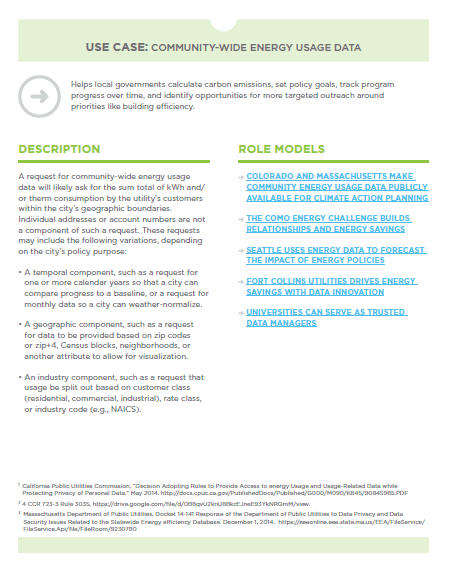Local governments across the country continue to set ambitious climate and energy goals, ranging from 80×50 to 100% renewable electric supply. In order to scope, prioritize, and fund the diverse initiatives required to achieve these goals, city sustainability staff often require locally-specific data about energy usage, building energy systems, energy program participation potential, and power supply. In many cases, electric and natural gas utilities represent the sole available source of this data and they may have little incentive to share it with policymakers. Utilities also may be actively prevented from releasing it under restrictive or ambiguous state regulations.
These rules may be well-intentioned, as regulators and policymakers seek to prevent the data from being used for commercial purposes, but the intended local government uses often demonstrate a clear public good. Furthermore, inhibiting access to energy data can lead to detrimental outcomes. For example, it becomes challenging to monitor energy program participation to ensure people have equitable access to savings opportunities. It also creates unnecessary hurdles for those planning district-level resilience projects to keep communities safe from natural disasters and weather extremes.
To guide local governments on how to navigate this complex issue, the Institute for Market Transformation (IMT) developed Rethinking Energy Data Access: Conquering Barriers to Achieve Local Climate Goals in consultation with the Urban Sustainability Directors Network (USDN). This report draws from the experiences of USDN members and best practices from around the country and shares critical insights to local governments seeking data from electric and natural gas utilities. USDN members include many of the largest local governments in the country—cities and counties who are seeking to prevent the worst impacts of climate change, promote equitable access to the benefits of clean and efficient energy, and build robust clean energy economies in the process.
Collaborative Efforts On the Rise to Unleash Utility Data
The good news is that a growing number of examples of successful collaboration between local governments, utilities, and utility regulators are shedding light on the most effective ways to overcome these obstacles and unleash the benefits of access to utility data. For example, the CoMo Energy Challenge in Columbia, Missouri, involved collaboration between the city, public schools, and three different utilities to identify school districts that had high potential to save energy and then to reach out to residents to provide efficiency information and tools. Commonwealth Edison and the city of Chicago have also worked together over the last decade to make private sector buildings more efficient. Building owners with at least four tenants can request whole-building data and confirm it is complete and accurate through a smooth, electronic process.
Rethinking Energy Data Access draws on the actual experiences of local governments who have requested data both with and without state-level data access rules and offers recommendations on how these rules can be designed more effectively to create consistent, usable datasets.
How to Use this Report
- Local government sustainability staff can use this report to articulate to utilities and utility regulators what types of energy data are necessary to create effective programs and policies. Five data use cases with recommended data management practices and examples can help local governments define their needs and create specific asks to utilities and regulators.
- Energy utilities can use this report to proactively understand the needs of local governments requesting data and to adopt clear and consistent data management practices around high-impact data sets.
- Public utility commissions can use this report to structure proceedings that will effectively engage data requestors and data management experts in order to adopt best practices that facilitate the public interest goals of local and state governments.
To learn more, read our report Rethinking Energy Data Access: Conquering Barriers to Achieve Local Climate Goals. An executive summary, and links to each of the use cases, can be found here.
Do you work for a local government that wants to make smarter policies based on utility data? Do you work for a utility regulator who wants to develop thoughtful policies around who can access utility data and why? Contact Julia Eagles at julia.eagles@imt.org.
The Urban Sustainability Directors Network (USDN) is a member-driven network of 200 cities and counties leading the way to a sustainable, low-carbon future by developing, adopting, and sharing practices that create equitable and prosperous communities and a healthy environment. More information about USDN membership can be found at USDN.org.




